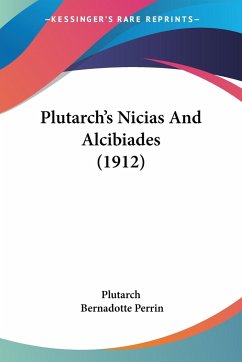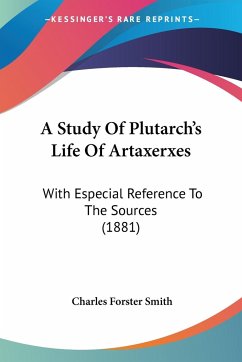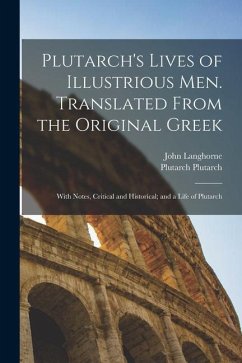
Plutarch's Nicias And Alcibiades (1912)
Versandkostenfrei!
Versandfertig in 1-2 Wochen
32,99 €
inkl. MwSt.

PAYBACK Punkte
16 °P sammeln!
Plutarch's Nicias and Alcibiades is a book that was published in 1912 and features two of the most prominent figures in ancient Greek history. The book is a collection of biographical essays written by Plutarch, a Greek historian and philosopher who lived during the first and second centuries AD.The first essay in the book is about Nicias, a general and politician from Athens who lived in the fifth century BC. Nicias is known for his role in the Peloponnesian War, a conflict between Athens and Sparta that lasted for over 25 years. Plutarch's essay examines Nicias' life and career, including hi...
Plutarch's Nicias and Alcibiades is a book that was published in 1912 and features two of the most prominent figures in ancient Greek history. The book is a collection of biographical essays written by Plutarch, a Greek historian and philosopher who lived during the first and second centuries AD.The first essay in the book is about Nicias, a general and politician from Athens who lived in the fifth century BC. Nicias is known for his role in the Peloponnesian War, a conflict between Athens and Sparta that lasted for over 25 years. Plutarch's essay examines Nicias' life and career, including his military campaigns and his efforts to negotiate peace with Sparta.The second essay in the book is about Alcibiades, another Athenian politician and general who lived during the Peloponnesian War. Alcibiades was known for his charisma and his ability to win over crowds, but he was also notorious for his reckless behavior and his tendency to switch sides in political alliances. Plutarch's essay explores Alcibiades' life and career, including his military campaigns and his role in the downfall of Athens.Overall, Plutarch's Nicias and Alcibiades is a fascinating look at two of the most important figures in ancient Greek history. The book provides valuable insights into the politics, military strategies, and social dynamics of ancient Athens, and it remains a valuable resource for historians and scholars today.This scarce antiquarian book is a facsimile reprint of the old original and may contain some imperfections such as library marks and notations. Because we believe this work is culturally important, we have made it available as part of our commitment for protecting, preserving, and promoting the world's literature in affordable, high quality, modern editions, that are true to their original work.












